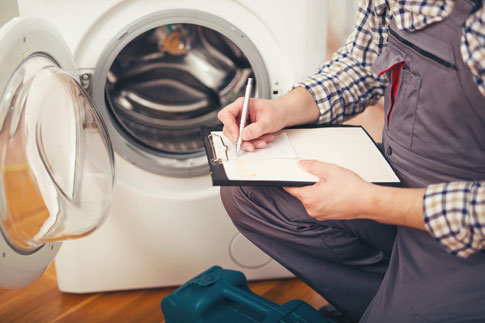Defective household appliances: repair or replace?

Has your refrigerator given up the ghost? Does your washing machine no longer spin? Dishwasher sprung a leak? Is it better to repair or replace your broken appliance? Well, it depends. Here are some tips to help you make the right decision.
First off, if your appliance is almost new, you should have it repaired because normally it will still be under warranty. But don’t call a repair contractor too quickly. Too many people pay for costly repairs when they could have solved the problem themselves. Take a few minutes to look at your appliance and ask yourself some questions.
- Did anyone touch the temperature control on the refrigerator?
- Was the refrigerator or freezer door held open by a drawer that hadn’t been properly closed or a container that got in the way?
- Is there a blown fuse in the control panel?
- Is the dryer exhaust duct blocked or crushed?
- Has the control knob on the washer been set incorrectly?
- Has there been a power outage? Has a breaker tripped?
You should also check the manufacturer’s instruction manual. It usually includes a troubleshooting checklist.
If it turns out the appliance is in fact defective, you’ll need to call in a specialist. Any doubts? CAA-Quebec’s Residential Advisory Services can provide advice.
Choose a certified appliance repair person
Repairing appliances has become a complex task, with simple electromechanical controls having been replaced by electronic circuit boards and models changing every two or three years. High-end European appliances are even more sophisticated in terms of design and components. So training and continuing education are essential.
Most repair persons are self-employed. Others work in the repair department of new or used appliance retailers, manufacturers, or for one of their certified repair contractors.
Ask for a written estimate for the work to be done

Whether it’s for an oven, refrigerator, freezer, dishwasher, washer, dryer, microwave, air conditioner or dehumidifier, ask for a written estimate for any repair over $50 (you can waive this by providing a document to that effect signed and written entirely in your own handwriting). First make sure that the cost of the repairs is less than what the appliance is still worth. The repair person must abide by the estimate once it has been accepted.
All appliance repairs are covered by a three-month legal warranty on parts and labour that will take effect from the date indicated on the invoice (the date the appliance is up and running again in your home). It should also indicate the type of repairs made and the price of any new, used, or reconditioned parts.
Recycle your old appliances
If repairing your fridge or other appliances is impossible or too expensive, you’ll need to get rid of them. If you buy a new one, the store will generally take back your old appliance, since many parts can be used to recondition other appliances.
Good news!
As appliance manufacturers are considered to be big greenhouse gas (GHG) emitters, since Dec. 5, 2020, Quebec has required them to recover and reclaim appliances at the end of their useful life, free-of-charge. This measure should reduce GHGs by 200,000 tons a year, the equivalent of 60,000 cars.
Of course, municipalities also offer pickup services for oversized items and recycling companies and second hand stores are more than willing to give old appliances new life. To find companies that recover, recycle, and reclaim products in your area, check out the search tool on the Recyc-Québec website.
Choose ENERGY STAR certified appliances
If you have to replace your appliance, a good option is to choose one certified by ENERGY STAR. It will be highly energy efficient and less costly to operate. For example, refrigeration appliances that are 10 or more years old consume up to 4.8 times more energy than a new appliance certified by ENERGY STAR. A certified appliance will save you money over its entire lifespan, which can be up to 10 to 21 years, depending on the type of appliance. Ainsi:
- ENERGY STAR certified refrigerators use 15 to 20% less energy than the Canadian energy efficiency standard.
- As for certified washing machines, they use up to 50% less energy and water!
So, are you going to repair or replace your household appliance?

Benefit from personalized advice
Do you have questions about your home, need specific information, or are you looking for referrals to find an Approved Supplier?